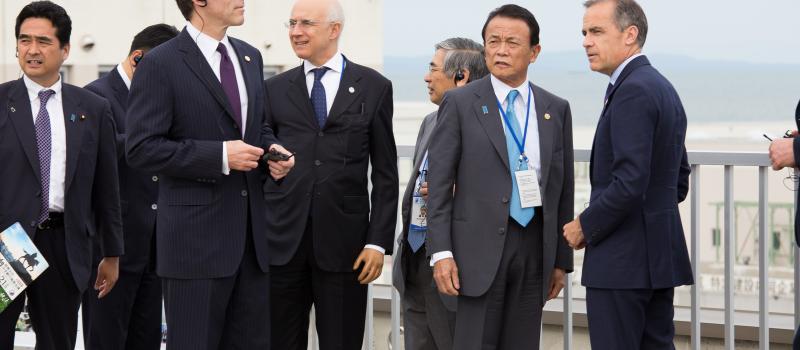EconVue Weekly Spotlight
posted by Lyric Hughes Hale on May 31, 2016 - 10:43am

This month the G7 finance meetings were held in Sendai, a city that experienced natural devastation in 2011. At the leaders' summit that followed, President Obama paid a historic visit to Hiroshima, whose destruction was entirely man made. Both cities have personal significance for me, going back to my exchange student days.
Visiting Sendai and the still-visible path of the 3/11 earthquake and tsunami underlined for me the fragility of human existence, and the need to work together when we can. However in Sendai last weekend it became clear that the G7 countries, among the richest and most developed in the world, are no longer able or willing to effectively coordinate policy.
In spite of sluggish global growth, members Britain and Germany will not support fiscal expansion. As the US contemplates interest rate hikes, Japan pioneers negative monetary policy. Policy divergence increases complexity and the possibility of policy failure. Perhaps only another crisis will bring them together again.
Stories in our Spotlight This Week
1. The G7 Meeting in Sendai: Mr Aso's PEF Project
Lyric Hughes Hale 5/23/16 Huffington Post
Something good did come out of the G7 meeting in Sendai. Japan has pledged $50M for an innovative program to fund the costs of a pandemic. The funds will be used to buy premiums from private insurers. Watch for other G7 countries to follow the Japanese lead.
2. Japan Won't Depopulate Quietly Into The Night
Anthony Fensom 5/20/16 The Diplomat
The central question for Japan's long term future. How can a country with a low birth rate and no immigration expect economic growth?
3. The False Promise of Negative Interest Rates
Robert Skidelsky 5/24/16 Project Syndicate
"As a biographer and aficionado of John Maynard Keynes, I am sometimes asked: “What would Keynes think about negative interest rates?”
Robert Skidelsky provides the clearest explanation I have read of the futility of current monetary policy, and why in spite of their reluctance, governments must spend money to end current stagnation.
4. How Technology Hijacks People's Minds -- From a Magician and Google's Design Ethicist
Tristan Harris 5/18/16 Medium Corp
How technology exploits our mind's weaknesses. Is a mobile phone really a kind of slot machine?
5. Fighting for an Alternative to Big Banks
Katherine Isaac 5/19/16 Inequality. org
Nearly 28% of US households are at least partially outside the financial mainstream, or underserved by traditional banks. A shocking 54% of African-American and 47% of Latino households are underserved.
EconVue Research and Insights
Everyone Will Lose if the UK Exits the EU -- Except Donald Trump and His Soulmate, Vladimir Putin Robert Shapiro
Keen Brexit analysis. This summer's surprise could be that Brexit itself exits.
Weekly Data Preview: May 31-June 3 Michael Lewis
As usual at the start of the new month, Friday’s employment report will be key. Most indicators are pointing to another respectable (at least) payroll performance in May. This, of course, will be the last jobs reading before the FOMC meets in mid-June.
Healthcare's Dysfunctional Pricing: Be Afraid. Be Very Afraid. David W. Johnson
Analysis on the Health Care Cost Institute (HCCI)‘s annual report of healthcare prices last month: to no-one’s surprise, HCCI found huge variation in commercial prices for 240 common medical services across 41 states.

